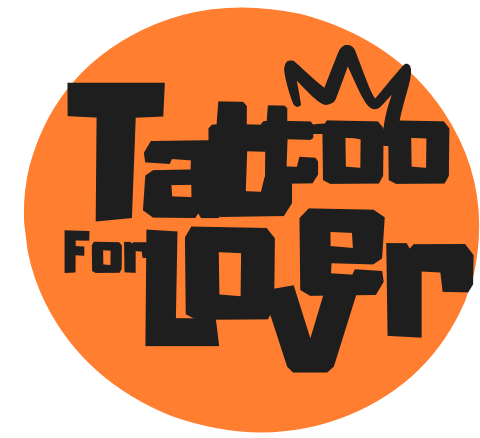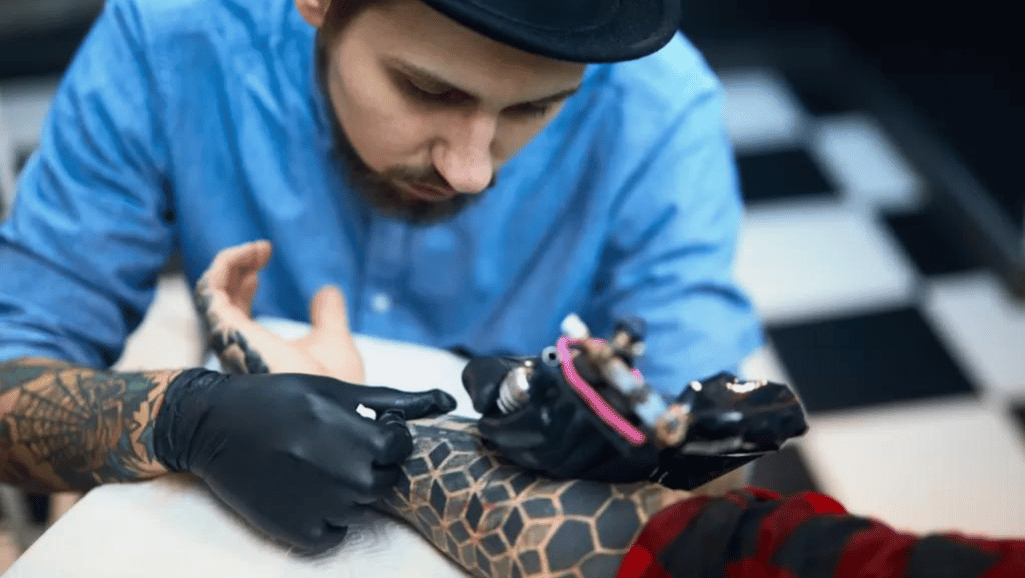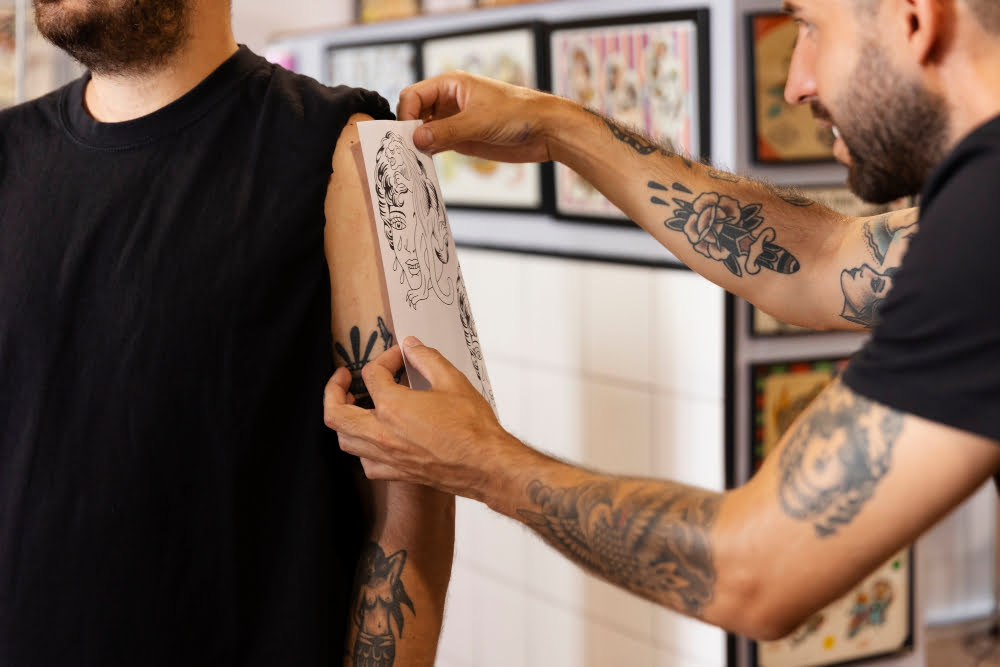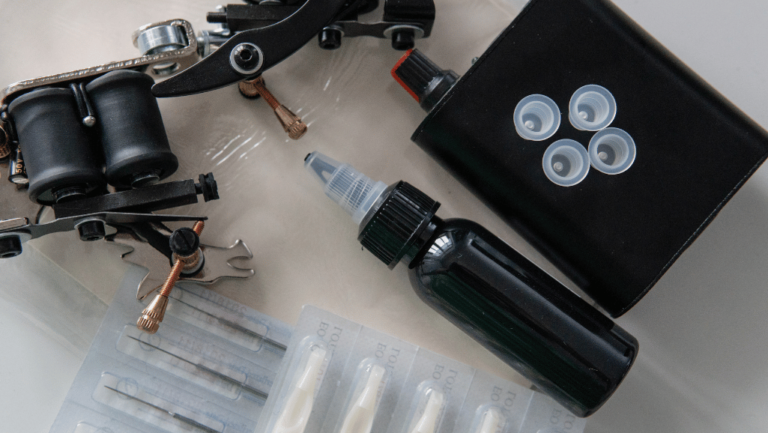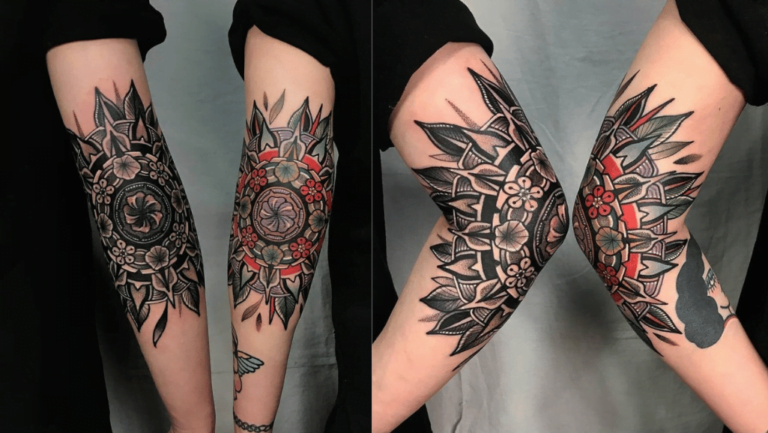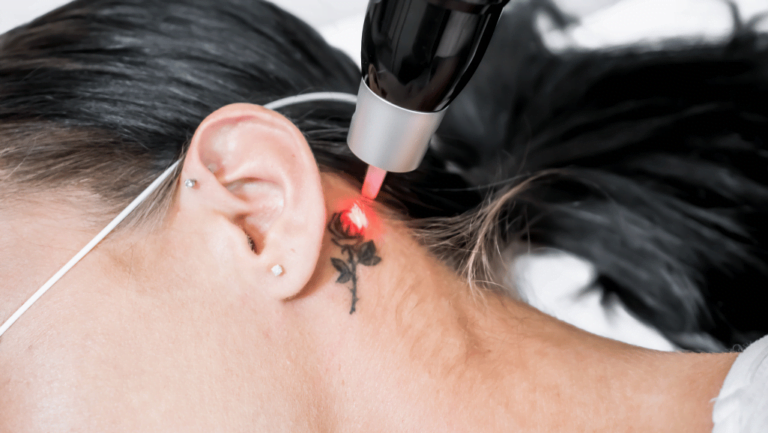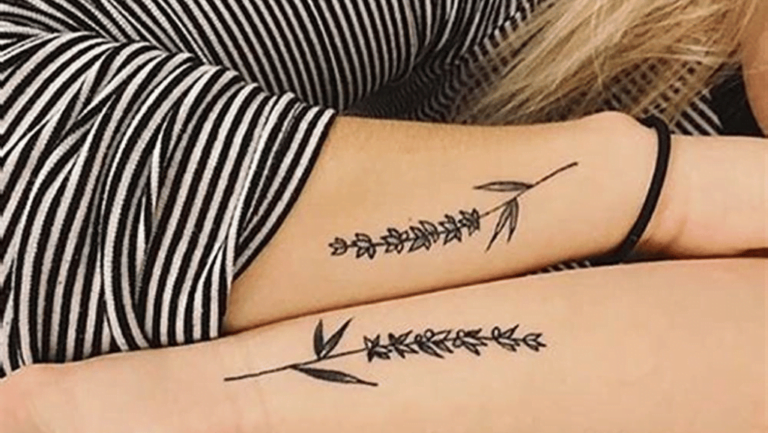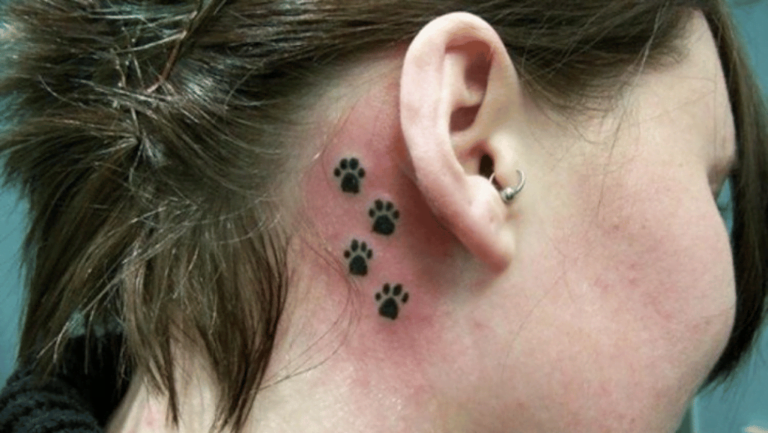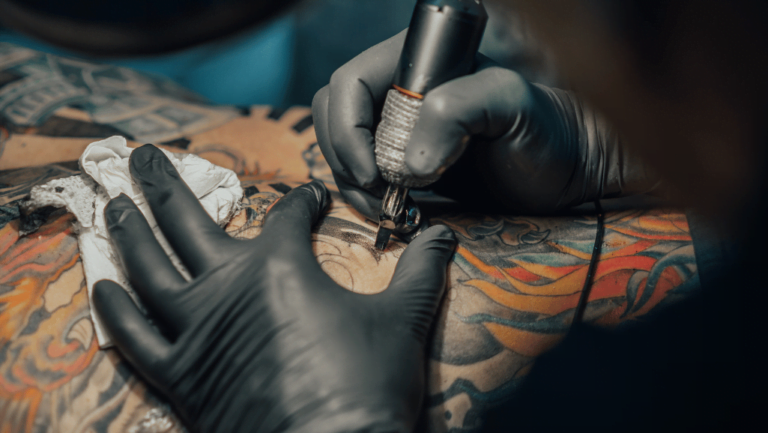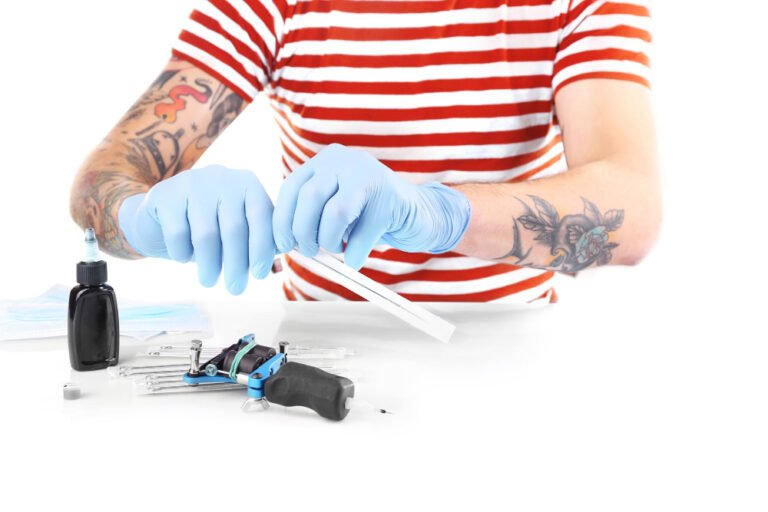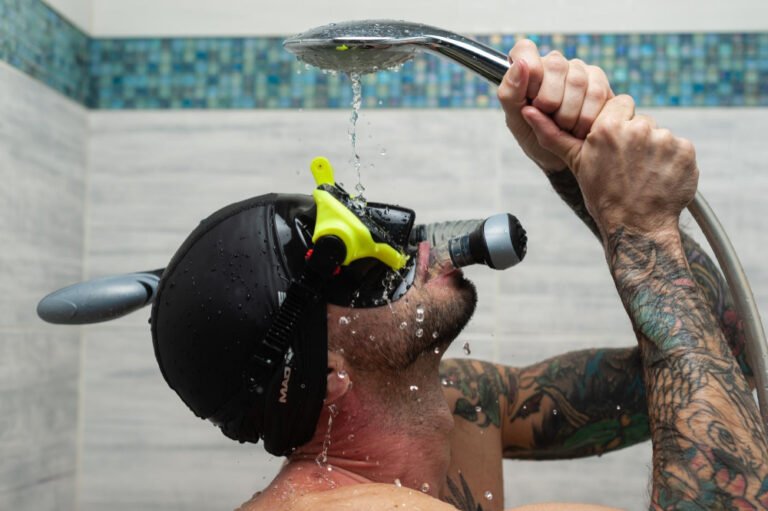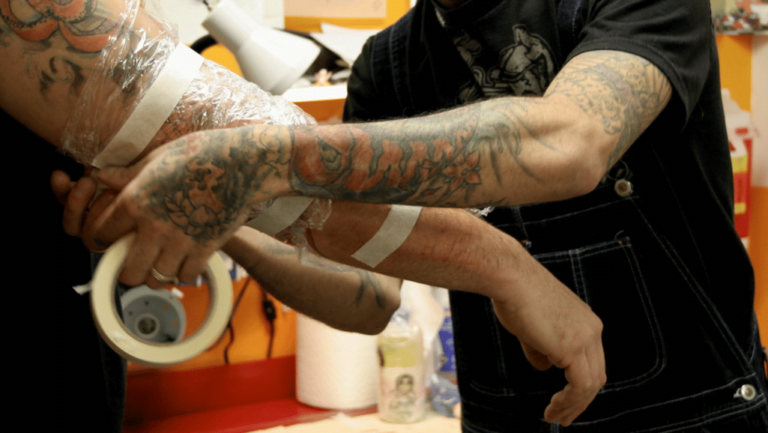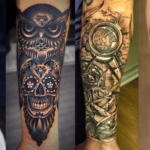Getting a tattoo is an exciting and personal experience. But have you ever wondered how long it actually takes to get a tattoo? The duration of a tattoo can vary depending on several factors that we will explore in this guide.
When it comes to tattooing, there is no one-size-fits-all answer to the question, “How long does it take to tattoo?” The time it takes to complete a tattoo depends on various factors, including the size, design, body placement, artist, and aftercare.
Small tattoos, like a symbol or letter, can be done in as little as half an hour to an hour. Medium-sized tattoos, such as a small animal or a quote, usually take around 2 to 3 hours. On the other hand, large tattoos, like a full sleeve or back piece, may require multiple sessions and several hours of tattooing time.
Factors that can affect how long a tattoo takes include the style of the tattoo and the body placement. Intricate designs or tattoos that involve shading or color may take longer to complete compared to simpler designs. Additionally, the pain tolerance of the individual and the level of aftercare can also impact the duration of the tattooing process.
Remember, getting a tattoo is a permanent decision, so it’s important not to rush the process. Take the time to discuss your design and estimated time with a professional tattoo artist who can provide guidance and create a unique piece of body art that you’ll love.
Key Takeaways:
- The duration of a tattoo depends on various factors such as size, design, body placement, artist, and aftercare.
- Small tattoos can take as little as half an hour to an hour, while large tattoos may require multiple sessions and several hours of tattooing time.
- Tattoo styles, such as intricate designs or those involving color or shading, can add to the overall duration of the tattoo process.
- Discuss your design and estimated time with a skilled tattoo artist to ensure a satisfactory and personalized result.
- Take the time to properly care for your tattoo after the process is complete to ensure the best possible heal.
Factors that Affect Tattoo Time Duration
When it comes to getting a tattoo, the duration can vary depending on several factors. Let’s explore the key factors that influence how long it takes to complete a tattoo:
Tattoo Style and Duration
The style of the tattoo plays a significant role in determining the time it takes to complete. Intricate designs with detailed shading and complex linework generally require more time and attention to detail. On the other hand, simple outline tattoos usually take less time to finish.
Body Placement and Tattoo Time
The placement of the tattoo on your body can also affect the duration of the tattooing process. Areas with more nerve endings or bony structures, such as the ribs or feet, may require extra caution and precision from the tattoo artist, adding to the overall time required for completion.
Pain Tolerance and Tattooing Time
Pain tolerance varies from person to person. If you have a higher pain tolerance, you may be able to sit for longer tattoo sessions without needing breaks. This means that individuals with a higher pain tolerance can have their tattoos completed in fewer sessions, reducing the overall time required.
Tattoo Aftercare and Duration
Proper aftercare is crucial for the healing process and can impact the overall duration of your tattoo. Following the artist’s instructions and taking good care of your tattoo during the healing period can ensure a faster and smoother healing process, resulting in shorter overall duration.
Color vs Black Ink Tattoos and Time
Tattoos that involve colored ink or shading tend to take longer to complete compared to black ink tattoos. Adding color requires more precision and layering, which can extend the duration of the tattooing process.
By considering these factors, you can have a better understanding of how long your tattoo may take to complete. Remember to consult with your tattoo artist for a more accurate estimate based on the specific details of your tattoo.
| Factors | Impact on Tattoo Duration |
|---|---|
| Tattoo Style | Complex designs take more time than simple outlines |
| Body Placement | Affects the level of skill and caution required, potentially increasing tattoo time |
| Pain Tolerance | Higher pain tolerance allows for longer sessions, reducing overall tattooing time |
| Tattoo Aftercare | Proper aftercare promotes faster healing, shortening the overall duration |
| Color vs Black Ink | Adding color or shading increases precision and layering, extending tattoo time |
How Long Does It Take to Get a Tattoo Sleeve?
Getting a tattoo sleeve is a significant commitment that requires a substantial amount of time. The duration of a tattoo sleeve can vary depending on the complexity and size of the design, as well as how well it heals and the artist’s style. A good quality tattoo sleeve can take anywhere from 30 to more than 60 hours to complete. This time is usually spread out over several weeks or even a year, as large-scale tattoos often require multiple sessions. The intricacy of the design and the use of color or shading can also impact the time needed to complete a tattoo sleeve.
When getting a tattoo sleeve, it’s essential to take into account the duration of the tattooing process. Tattoo artists typically work in sessions to avoid overworking the skin and maintain the quality of the design. The number of sessions required for a tattoo sleeve depends on various factors, such as the complexity of the design and the client’s pain tolerance. Additionally, the healing process between sessions is crucial to ensure a successful outcome.
During each session, the tattoo artist will work on specific sections of the design, gradually completing the entire sleeve. The duration of each session will vary, but it’s not uncommon for a single session to last several hours. Depending on the artist’s availability and the client’s schedule, the sessions may be spaced out by a few weeks or longer, allowing the skin to heal and the client to rest.
The process of completing a tattoo sleeve involves meticulous planning and collaboration between the artist and the client. It’s essential to communicate your expectations and ideas clearly to ensure that the final result aligns with your vision. The artist may also provide guidance on factors such as design placement, color choices, and additional details.
Factors Affecting Tattoo Sleeve Duration:
- Design complexity
- Size of the tattoo sleeve
- Healing process and aftercare
- Number of sessions required
- Artist’s style and technique
Each of these factors can influence the duration of the tattoo sleeve process. An intricate design with fine details and a large surface area will naturally take longer to complete. Similarly, a tattoo that requires extensive shading or color saturation will demand additional time. Collaborating closely with your chosen artist will help you understand the estimated timeline for your tattoo sleeve and manage your expectations accordingly.
While the process of getting a tattoo sleeve may require a considerable amount of time, it’s important to remember that the end result will be a unique and personal work of art. Take the time to research tattoo artists, discuss your ideas, and be patient throughout the process. The investment in time will ultimately result in a tattoo sleeve that you can wear with pride for a lifetime.
Would you like to read Spiritual Tattoo Ideas for Mindful Souls
| Factors Affecting Tattoo Sleeve Duration | Average Time |
|---|---|
| Design complexity | Varies based on intricacy |
| Size of the tattoo sleeve | 30 – 60+ hours |
| Healing process and aftercare | Depends on individual healing |
| Number of sessions required | Spread over weeks or months |
| Artist’s style and technique | Varies based on artist |
Design Complexity and Tattoo Duration
When it comes to tattooing, the complexity of the design plays a significant role in determining the duration of the tattooing process. Intricate tattoos with intricate details, delicate filigree work, or designs that require color gradations or realistic elements often take longer to complete. The level of detail needed for portrait tattoos, such as paying attention to small structures like eyelashes and lips, also requires more time and concentration.
Custom tattoo designs can also affect the duration of the tattooing process. These designs may require additional time for the artist to adapt or change the design to fit their style, ensuring that the client’s vision is brought to life. The level of customization and collaboration involved in the design process can increase the overall time needed for tattoo completion.
Another factor that influences the time it takes to complete a tattoo is the style of the artist. Artists who prefer using solid gradients of gray or utilize stippling techniques for black and gray tattoos may require more time for precision and shading, compared to artists utilizing different techniques.
Overall, the intricacy, level of customization, and the artist’s style all contribute to the duration of the tattooing process. It’s crucial for individuals to communicate their desired design and expectations with their chosen tattoo artist, ensuring a clear understanding of the time commitment involved.
| Tattoo Design | Average Duration |
|---|---|
| Intricate designs with small details | Longer |
| Designs with color gradations or realistic elements | Longer |
| Portrait tattoos with attention to small structures | Longer |
| Custom designs requiring adaptation | Additional time needed |
| Artist style using solid gradients or stippling | Time consuming |
Conclusion
In conclusion, the duration of a tattoo is influenced by various factors. The size of the tattoo, design complexity, body placement, pain tolerance, aftercare, and the use of color or black ink all play a role in determining how long it takes to complete a tattoo.
Smaller tattoos can be done in as little as half an hour, while larger tattoos like sleeves may require multiple sessions and several hours of tattooing time. Intricate and detailed designs often take longer to complete, as they require careful precision and attention to detail.
It is important not to rush the tattooing process, as it is a permanent decision. Taking the time to discuss the design and estimated time with a tattoo artist beforehand can help manage expectations and prevent any surprises. Remember, the investment of time and effort in getting a tattoo will ultimately result in a unique and meaningful piece of body art.
FAQ
How long does it take to get a tattoo?
What factors affect the duration of a tattoo?
How long does it take to get a tattoo sleeve?
Does the design complexity affect the duration of a tattoo?
What is the conclusion on tattoo duration?
Forhad
Forhad's writing is not just about the artistry of tattoos or the latest trends in the industry; it's an exploration of the deep-rooted connections people have with their tattoos, reflecting personal narratives, cultural histories, and moments of transformation. Through a mix of in-depth features, personal narratives, and insightful analyses, he sheds light on the multifaceted nature of tattooing, revealing the emotional and cultural layers that lie beneath the surface.

